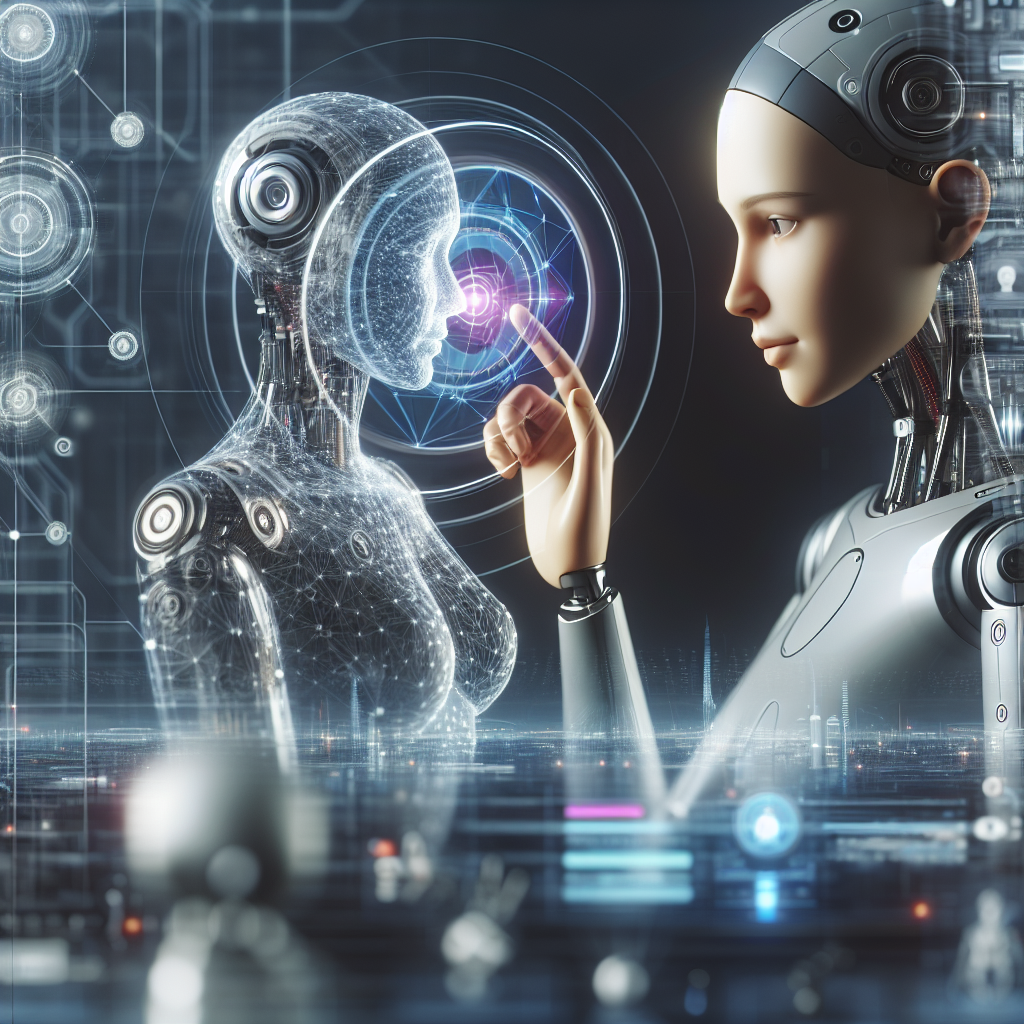As we stand on the brink of 2025, the landscape of technology is evolving at an unprecedented pace. One of the most transformative forces in this evolution is artificial intelligence (AI). For Generation Beta, or those currently in their late teens and early twenties, the coming years will bring about a revolution in AI that will reshape the way we live, work, and interact with the world. This article delves into the significant advancements in AI expected by 2025, offering insights and practical advice for Gen Beta to navigate and thrive in this new era.
The Rise of AI: A Brief History
To fully appreciate the significance of AI’s future developments, it’s essential to understand its past. The concept of AI has been around since the mid-20th century, but it wasn’t until the 21st century that it began to gain substantial traction. The advent of big data, powerful computing resources, and sophisticated algorithms has been instrumental in advancing AI to its current state. From simple rule-based systems to complex neural networks, AI has come a long way and is poised to make even more significant strides in the coming years.
Key AI Advancements by 2025
By 2025, AI is expected to make several groundbreaking advancements that will have far-reaching implications. Here are some of the most notable areas of development:
1. Enhanced Natural Language Processing (NLP)
Natural Language Processing, or NLP, is a branch of AI that focuses on enabling machines to understand and generate human language. By 2025, NLP is anticipated to become even more sophisticated, allowing for more natural and contextually accurate interactions. This will have a profound impact on areas such as customer service, content creation, and language translation. For example, chatbots and virtual assistants will become more conversational and empathetic, enhancing user experiences and reducing the need for human intervention.
2. Advanced Machine Learning and Deep Learning
Machine learning and deep learning are at the heart of AI’s ability to learn and improve over time. By 2025, these technologies will become more efficient and accessible, enabling a broader range of applications. For instance, deep learning models will be capable of processing and analyzing vast amounts of data in real-time, leading to more accurate predictions and insights. This will be particularly valuable in industries such as healthcare, finance, and autonomous vehicles.
3. Robotics and Automation
AI-driven robotics and automation will continue to advance, making it possible to automate more complex and intricate tasks. By 2025, we can expect to see robots that are more dexterous, adaptive, and capable of performing a wider range of functions. This will have significant implications for manufacturing, logistics, and even household chores. For example, robots may become more prevalent in elderly care, providing assistance and companionship to an aging population.
4. AI in Healthcare
Healthcare is one of the areas where AI is expected to have a transformative impact by 2025. AI-powered diagnostic tools will become more accurate and accessible, enabling earlier detection and treatment of diseases. Additionally, personalized medicine will become more viable, with AI algorithms capable of tailoring treatments to individual patients based on their genetic profiles and medical histories. This will lead to more effective and efficient healthcare, ultimately improving patient outcomes and reducing costs.
5. Ethical and Regulatory Considerations
As AI continues to advance, ethical and regulatory considerations will become increasingly important. Issues such as data privacy, algorithmic bias, and the responsible use of AI will need to be addressed to ensure that the benefits of AI are realized without compromising human values. By 2025, we can expect to see more robust frameworks and guidelines for the ethical deployment of AI, providing a foundation for trust and accountability.
The Impact on Gen Beta
For Generation Beta, the advancements in AI by 2025 will bring both opportunities and challenges. Here are some key areas where AI will have a significant impact:
1. Education
AI will transform the educational landscape, offering personalized learning experiences tailored to individual students. Adaptive learning systems will be able to identify a student’s strengths and weaknesses, providing targeted resources and support. This will not only enhance the learning process but also make education more accessible and inclusive. For Gen Beta, this means a more dynamic and engaging educational experience that prepares them for the AI-driven world of the future.
2. Employment
The job market will be significantly influenced by AI, with some jobs becoming obsolete while new ones emerge. Gen Beta will need to be adaptable and continuously upskill to remain competitive. Skills in areas such as data analysis, programming, and digital literacy will be in high demand. Additionally, soft skills such as creativity, critical thinking, and emotional intelligence will become increasingly important as AI takes over more routine and repetitive tasks.
3. Social Interactions
AI will also change the way we interact with each other and with technology. Social media platforms, for example, will become more intelligent, providing more relevant and personalized content. Virtual assistants and AI-powered chatbots will become more prevalent, making it easier to manage personal and professional tasks. However, there is also a need to be cautious about the potential for AI to isolate individuals and erode human connections. Gen Beta will need to strike a balance between embracing the benefits of AI and maintaining meaningful human interactions.
Preparing for the AI Revolution
Given the significant advancements in AI expected by 2025, it’s crucial for Gen Beta to be proactive in preparing for this new era. Here are some steps that can be taken:
- Stay Informed: Keep up-to-date with the latest developments in AI by following relevant news sources, attending webinars, and participating in online communities. This will help you understand the trends and opportunities in the field.
- Develop Relevant Skills: Invest in acquiring skills that are in demand in the AI-driven job market. This could include programming languages, data analysis, and machine learning. Many online platforms offer courses and certifications that can help you build these skills.
- Embrace Lifelong Learning: The rapid pace of technological change means that continuous learning is essential. Be open to new ideas and be willing to adapt as the landscape evolves. This mindset will help you stay ahead of the curve and remain competitive.
- Engage in Ethical Considerations: As AI becomes more prevalent, it’s important to consider the ethical implications. Engage in discussions about the responsible use of AI and advocate for transparency and accountability in its deployment.
- Build a Network: Connect with others who are interested in AI and technology. Join professional organizations, attend conferences, and collaborate on projects. Networking can provide valuable insights and opportunities as you navigate the AI landscape.
Real-World Examples and Case Studies
To better understand the potential impact of AI by 2025, let’s explore some real-world examples and case studies:
1. Healthcare: AI-Powered Diagnostics
One of the most promising applications of AI in healthcare is in diagnostics. For example, a study published in the journal Nature Medicine demonstrated that an AI system could accurately diagnose skin cancer as well as dermatologists. By 2025, such AI systems are expected to become even more advanced, making it possible to detect diseases at earlier stages and with greater precision. This will lead to more effective treatments and improved patient outcomes.
2. Finance: Algorithmic Trading
In the financial sector, AI is already being used to automate trading and investment decisions. By 2025, algorithmic trading is expected to become more sophisticated, with AI systems capable of analyzing vast amounts of data in real-time to make informed decisions. This will not only increase the efficiency of financial markets but also make it easier for individual investors to access advanced investment strategies.
3. Transportation: Autonomous Vehicles
The development of autonomous vehicles is one of the most exciting areas of AI. By 2025, we can expect to see more widespread adoption of self-driving cars, which will have a significant impact on transportation. Autonomous vehicles will reduce the risk of accidents, improve traffic flow, and provide greater accessibility for individuals who are unable to drive. However, there are also challenges to be addressed, such as regulatory frameworks and public acceptance.
Conclusion
The advancements in AI by 2025 will bring about a new era of technological innovation and transformation. For Generation Beta, this presents both opportunities and challenges. By staying informed, developing relevant skills, and embracing a mindset of lifelong learning, Gen Beta can navigate the AI revolution and thrive in the years to come. As AI continues to evolve, it’s essential to remain adaptable and open to new possibilities. The future is bright, and with the right preparation, Gen Beta can play a leading role in shaping it.

